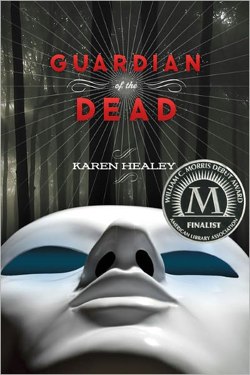Normal
0
MicrosoftInternetExplorer4
/* Style Definitions */
table.MsoNormalTable
{mso-style-name:“Table Normal”;
mso-tstyle-rowband-size:0;
mso-tstyle-colband-size:0;
mso-style-noshow:yes;
mso-style-parent:“”;
mso-padding-alt:0cm 5.4pt 0cm 5.4pt;
mso-para-margin:0cm;
mso-para-margin-bottom:.0001pt;
mso-pagination:widow-orphan;
font-size:10.0pt;
font-family:“Times New Roman”;
mso-fareast-font-family:“Times New Roman”;}
Guardian of the Dead is the YA debut novel of Antipodean author Karen Healey. Published in hardback last year, it made it onto the 2011 finalist panel for the American Library Association’s William C. Morris Debut Award. It’s just been released in paperback—which is fortunate for those of us who find our discretionary spending rather limited these days, because Guardian is a startlingly good book. Despite the fact that the paperback’s back copy, with its talk of unhealthy fascinations and shocking revelations and lusts, makes it sound more like tabloid fodder than intelligent and character-driven YA.
[It’s about chimaeras. Chimaeras and balance]
Ellie Spencer is seventeen years old and spending her last year of school at boarding school in Christchurch, New Zealand, while her parents celebrate her mother’s having survived a bout with cancer by taking a lengthy round-the-world trip. Her life is perfectly normal, from beer cans in the bottom drawer to concerns over friends, exams and class.
That is, until a bizarre woman with pupil-less eyes and an allergy to the smell of cooked food starts taking far too close an interest in her best friend Kevin, and repeated encounters with school loner Mark Nolan begin to convince her that something is very wrong. As Ellie’s eyes are opened to a world of magic and Maori mythology, she learns both that Kevin is in danger from a New Zealand fairy—a patupaiarehe—who wants to steal him away in order to have his children, and that the recent Eyeslasher murders on New Zealand’s North Island aren’t merely the work of a serial killer with an eye fetish, but represent a danger which threatens everything she holds dear.
Both friendship and betrayal have a part to play in the final confrontation for the fate of New Zealand, but in the end it comes down to Ellie’s stubbornness and bravery, her willingness to stand in front of Hine-nui-te-po, the Maori guardian of the dead, and—most of all—her choices.
There’s a lot to like in Guardian of the Dead. For me, the world of Ellie’s New Zealand boarding school resonates with much more familiarity than the high schools of most American young adult fiction—I come from a background where uniforms and examinations are the rule, not the exception—so I imagine it might be a touch unusual for U.S. readers.
The school is merely a backdrop, however. Ellie is a very strongly drawn character, recognisably a young adult with the strengths and weaknesses of a seventeen-year-old: her self-consciousness, her body-image worries, her slightly rusty black belt in tae kwon do, her awkwardness in making friends, and her crush on Mark Nolan. The other characters are likewise strongly drawn: Nolan, who thinks of himself as a monster; Kevin, asexual, loyal, abashed; Iris Tsang and the mysterious Reka.
Strong as the characters are, the depiction of Maori mythology is even stronger. It makes and shapes the book, a rich layering of history and mythic implication that draws you in and makes you care. As a stranger to this particular mythology, I found it both moving and gripping.
Healey also uses Shakespearean and classical references to good effect. It seems clear to me that this is a story very much concerned with stories themselves, and with how stories shape our worlds.
That’s not to say that this is a perfect book. The beginning is somewhat slow to get going, and when the focus changes from the more personal story to the wider threat, it feels a little jarring. But despite these small flaws, Guardian of the Dead is well-written and compelling. I enjoyed it immensely, and I have no hesitation about recommending it to adult and young adult readers alike.
Normal
0
MicrosoftInternetExplorer4
/* Style Definitions */
table.MsoNormalTable
{mso-style-name:“Table Normal”;
mso-tstyle-rowband-size:0;
mso-tstyle-colband-size:0;
mso-style-noshow:yes;
mso-style-parent:“”;
mso-padding-alt:0cm 5.4pt 0cm 5.4pt;
mso-para-margin:0cm;
mso-para-margin-bottom:.0001pt;
mso-pagination:widow-orphan;
font-size:10.0pt;
font-family:“Times New Roman”;
mso-fareast-font-family:“Times New Roman”;}
Liz Bourke is reading for a postgraduate degree in Classics at Trinity College, Dublin. She also reviews for Ideomancer.com.











I looove me some Maori mythology (if you’re partial to the stuff, pick up Potiki by Patricia Grace). I will definitely have to look into this book. :-)
Thanks for the rec: I’ll keep an eye out.